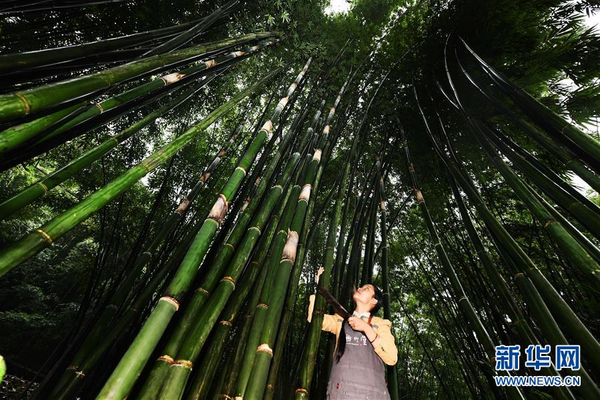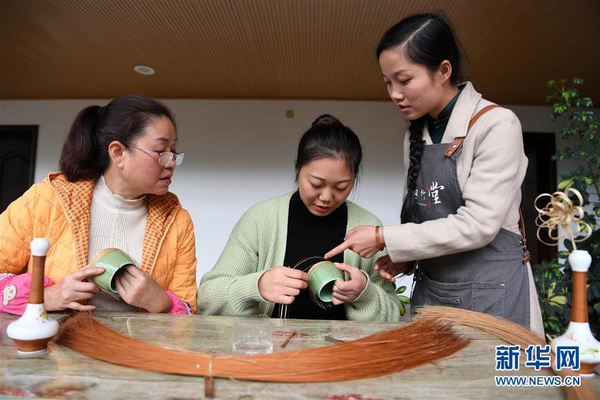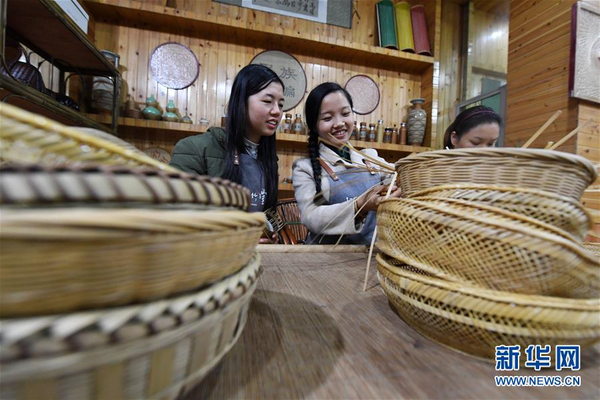Bamboo Weaving Craftswoman Leads Villagers to Shake off Poverty
Yang Changqin is a post-90s craftswoman who is skilled in bamboo weaving; the youngest deputy of the Guizhou delegation to the 13th National People's Congress; the inheritor of the provincial intangible cultural heritage of Chishui bamboo weaving; and also a role model leading villagers to get rid of poverty.
Yang was born in a family of Miao ethnic group in Yinjiang County, Southwest China's Guizhou Province. She once had a happy family, but sadly her father died from cancer when she was just 8. Her family lived a tough life since then. She entered a vocational school when she was 16, to reduce the burden of the family.
When she was studying at the school, she learned bamboo weaving from the craft master Chen Wenlan in Guizhou's Chishui City with government funding.
Bamboo weaving features more than 20 different processes. At the beginning, Yang would often hurt her hands with the bamboo or the knife. Now, Yang is the youngest craft master of bamboo weaving in Guizhou Province and the scars on her hands are a testament to her industrious practice.
"I was attracted by bamboo weaving when I learned the skills for the first time. I hope to treat it as my lifelong career. To me, it is the biggest happiness that I can do what I like," she said.
 |
| Yang Changqin selects bamboos for weaving. [Xinhua] |
With her love for bamboo weaving and her diligent practice, Yang's skills became increasingly proficient. Her bamboo weaving works won a number of provincial awards, but she was never satisfied.
"We should not only inheriting the manufacturing skills of intangible cultural heritage, but also make innovative crafts that are close to life, which helps pass on the culture to next generations and expand the sales market," Yang said, adding that many traditional crafts are exquisite, but they have some limitations in style and practicability, which young people find hard to accept.
In order to integrate traditional techniques with modern life, Yang technically improved bamboo weaving products, creatively transforming two-dimensional bamboo weaving into three-dimensional weaving, which she used to create objects such as a bamboo woven tea pot.
"Culture cannot be inherited by only one or two people. The government should pay more attention to the inheritors of intangible cultural heritage, especially young people, and give them more support," Yang said, adding that she hopes more young people could engage in the industry of making traditional crafts, using their creativity to make more new products.
With the improvement of her skills, Yang began to teach students, most of whom were left-behind women whose husbands have migrated to other places for work or impoverished people. Yang taught them for free to let them master a skill for earning a living.
 |
| Yang Changqin (R) teaches students how to weave bamboo on a teacup. [Xinhua] |
In 2012, with the financial support of the People's Government of Chishui Municipal, Yang established her own company, which has reached an annual sales amount of 3 million yuan (US $432,077).
Chishui has about 88,500 hectares of bamboo forest. The bamboo industry is an important channel for local farmers to increase their income. Now, Yang's company has expanded its distribution channel using an e-commerce platform, and launched free training courses for local villagers to learn the bamboo-weaving skills.
Led by Yang, the bamboo weaving industry of Chishui has become a high-end tourism craft, lifting local farmers out of poverty and becoming rich.
 |
| Yang Changqin (C) shares skills with other craftswomen in the Chishui bamboo weaving training base. [Xinhua] |
(Source: China Youth Daily/Translated and edited by Women of China)
Please understand that womenofchina.cn,a non-profit, information-communication website, cannot reach every writer before using articles and images. For copyright issues, please contact us by emailing: website@womenofchina.cn. The articles published and opinions expressed on this website represent the opinions of writers and are not necessarily shared by womenofchina.cn.

 京公网安备 11010102004314号
京公网安备 11010102004314号